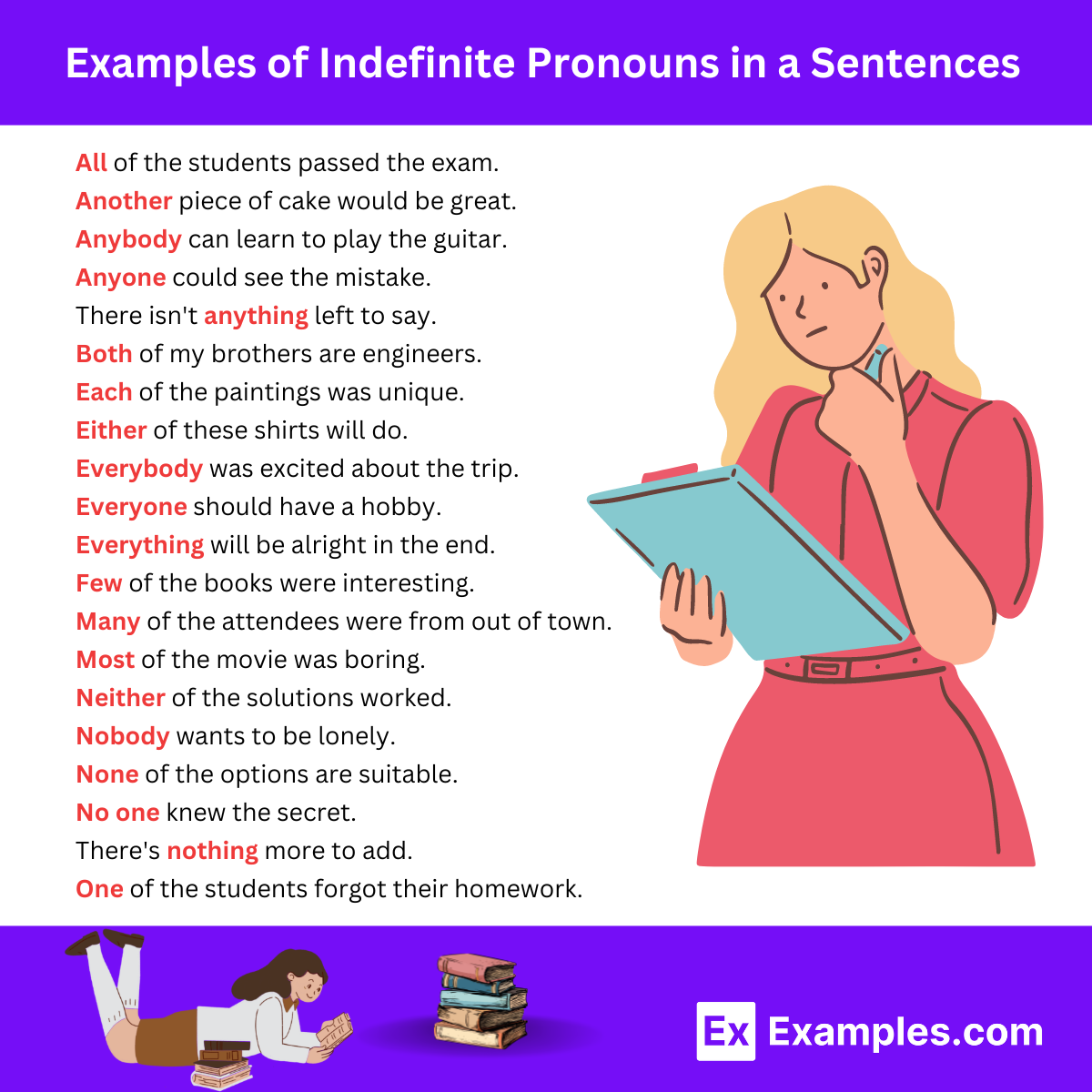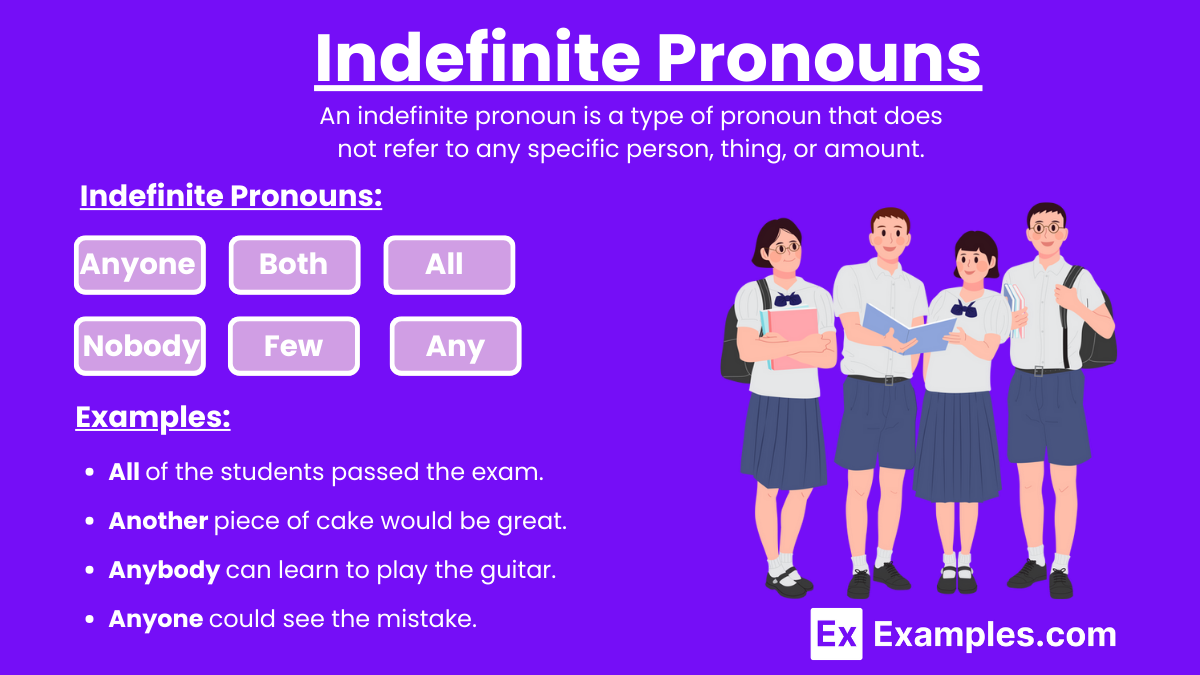50+ Indefinite Pronoun Examples
Indefinite pronouns are words that replace nouns without specifying which noun they replace. They refer to non-specific people or things, such as “someone,” “anything,” “everyone,” and “nobody.” These pronouns are essential for sentences where the exact identity of the noun is unknown or irrelevant. Indefinite pronouns can be singular (e.g., “each,” “either”), plural noun (e.g., “both,” “few”), or variable (e.g., “all,” “none”), making them crucial in the parts of speech for flexible communication.
What Is an Indefinite Pronoun?
An indefinite pronoun is a type of pronoun that does not refer to any specific person, thing, or amount. Unlike definite pronouns such as “he,” “she,” or “they,” which point to particular individuals or groups, indefinite pronouns are more general. Examples include words like “someone,” “anything,” “everyone,” “nothing,” and “several.” They are used to express a nonspecific idea and can refer to singular or plural subjects
Examples of Indefinite Pronouns
Singular Indefinite Pronouns:
- Anyone
- Everyone
- Someone
- No one
- Anybody
- Somebody
- Nobody
- Anything
- Everything
- Something
- Nothing
- Each
- Either
- Neither
Singular or Plural Indefinite Pronouns (depending on context):
- Both
- Few
- Many
- Several
- All
- Any
- More
- Most
- None
- Some
Indefinite Pronouns List
| Indefinite Pronouns | Indefinite Pronouns |
|---|---|
| anybody | many |
| anyone | several |
| anything | all |
| each | any |
| either | most |
| everybody | none |
| everyone | some |
| everything | neither |
| nobody | no one |
| nothing | one |
| somebody | both |
| someone | few |
Examples of Indefinite Pronouns in a Sentences

- All of the students passed the exam.
- Another piece of cake would be great.
- Anybody can learn to play the guitar.
- Anyone could see the mistake.
- There isn’t anything left to say.
- Both of my brothers are engineers.
- Each of the paintings was unique.
- Either of these shirts will do.
- Everybody was excited about the trip.
- Everyone should have a hobby.
- Everything will be alright in the end.
- Few of the books were interesting.
- Many of the attendees were from out of town.
- Most of the movie was boring.
- Neither of the solutions worked.
- Nobody wants to be lonely.
- None of the options are suitable.
- No one knew the secret.
- There’s nothing more to add.
- One of the students forgot their homework.
- Other people have different opinions.
- The others decided to go home early.
- Several of the members volunteered.
- Some of the answers were incorrect.
- Somebody has to take responsibility.
- Someone left the door open.
- Something smells delicious.
- Such things happen all the time.
- Any of these books can be borrowed.
- Much of the work has been done.
Singular and Plural Indefinite Pronouns Examples
Singular Indefinite Pronouns
- Anybody can answer the question.
- Each of the participants received a medal.
- Everyone in the room was silent.
- Everything is ready for the party.
- Nobody knows the truth.
- Nothing can stop us now.
- One of the apples is missing.
- Somebody left their jacket.
- Something is wrong with the car.
- Another cup of coffee would be nice.
Plural Indefinite Pronouns
- Both of the cats are sleeping.
- Few were able to solve the puzzle.
- Many are called, but few are chosen.
- Others have different opinions.
- Several of the players were injured.
- They bought some of the cookies.
- Few students completed the assignment on time.
- Both teams played exceptionally well.
- Several suggestions were considered.
- Many came to the concert.
How to Use Indefinite Pronouns
Indefinite pronouns refer to nonspecific people, things, or amounts. They can be singular, plural, or both, and are used to make generalizations or to talk about unknown or undefined items. Here are some guidelines and examples for using indefinite pronouns effectively.
1. Identify the Type of Indefinite Pronoun
- Singular Indefinite Pronouns: Refers to one person, thing, or amount.
- Examples: anybody, anyone, anything, each, either, everybody, everyone, everything, nobody, no one, nothing, one, somebody, someone, something
- Plural Indefinite Pronouns: Refers to more than one person, thing, or amount.
- Examples: both, few, many, others, several
- Singular or Plural Indefinite Pronouns: Can refer to one or more than one person, thing, or amount depending on context.
- Examples: all, any, more, most, none, some
2. Match Pronouns with Correct Verbs
- Singular Pronouns take singular verbs.
- Example: “Everyone is excited about the trip.”
- Example: “Each of the students has a book.”
- Plural Pronouns take plural verbs.
- Example: “Many are interested in the new policy.”
- Example: “Few were able to finish the race.”
- Singular or Plural Pronouns: Match the verb to the noun they refer to.
- Example: “All of the cake is gone.” (singular noun)
- Example: “All of the cookies are gone.” (plural noun)
3. Use Pronouns to Avoid Repetition
- Use indefinite pronouns to avoid repeating nouns.
- Example: “She didn’t see anyone she knew at the party.” (instead of listing specific names)
- Example: “Somebody left their phone on the table.”
4. Ensure Clear Antecedents
- Make sure the reference of the pronoun is clear to avoid confusion.
- Example: “Everything was ready for the event.” (clear that “everything” refers to all preparations)
- Example: “Someone should turn off the lights.” (clear that “someone” refers to any person)
5. Use Appropriately in Sentences
- Use indefinite pronouns to make general statements or ask questions.
- Example: “Does anybody have a pen?”
- Example: “Nobody knows the answer to the question.”
Indefinite Pronouns Exercises
Exercise 1: Fill in the Blanks
Fill in the blanks with the correct indefinite pronoun from the list below: ( anybody, something, few, everyone, none, several, everything, nobody, somebody, each )
- __________ was excited about the new movie.
- __________ can join the club; it’s open to all.
- I found __________ on the table; it looks important.
- There are only a __________ people who understand this concept.
- __________ of the cookies were eaten.
- __________ left their jacket in the classroom.
- __________ is allowed to participate in the event.
- __________ of the answers is correct.
- __________ of the books are on the shelf.
- __________ needs to take responsibility for the mess.
Exercise 2: Correct the Sentence
Rewrite each sentence with the correct form of the indefinite pronoun in parentheses.
- Anybody in the class have a question? (have/has)
- Several of the students was absent today. (was/were)
- Everything are ready for the presentation. (are/is)
- Each of the answers were correct. (were/was)
- Someone left their book on the table. (their/his or her)
Exercise 3: Identify the Pronoun
Identify the indefinite pronoun in each sentence.
- Everyone loves a good mystery novel.
- Something in the room smells delicious.
- Both of my brothers are engineers.
- Nobody knew the answer to the riddle.
- Few have ever seen such a sight.
Answers
Exercise 1: Fill in the Blanks
- Everyone was excited about the new movie.
- Anybody can join the club; it’s open to all.
- I found something on the table; it looks important.
- There are only a few people who understand this concept.
- None of the cookies were eaten.
- Somebody left their jacket in the classroom.
- Each is allowed to participate in the event.
- None of the answers is correct.
- Several of the books are on the shelf.
- Somebody needs to take responsibility for the mess.
Exercise 2: Correct the Sentence
- Anybody in the class has a question?
- Several of the students were absent today.
- Everything is ready for the presentation.
- Each of the answers was correct.
- Someone left his or her book on the table.
Exercise 3: Identify the Pronoun
- Everyone loves a good mystery novel.
- Something in the room smells delicious.
- Both of my brothers are engineers.
- Nobody knew the answer to the riddle.
- Few have ever seen such a sight.
FAQ’s
Can indefinite pronouns be both singular and plural?
Yes, pronouns like “all,” “some,” “none,” and “any” can be singular or plural depending on context.
How do you use “each” in a sentence?
“Each” refers to individual members of a group: “Each student received a book.”
When should you use “none”?
“None” can mean not any or no part: “None of the cookies were eaten.”
What is the rule for subject-verb agreement with indefinite pronouns?
Singular indefinite pronouns take singular verbs; plural indefinite pronouns take plural verbs.
Can indefinite pronouns be possessive?
Yes, they can show possession: “Everyone’s opinion matters.”
How do you use “anyone” correctly?
“Anyone” refers to any person: “Anyone can join the club.”
What is the difference between “someone” and “anyone”?
“Someone” refers to an unspecified person, while “anyone” refers to any person without restriction.
How do you use “several” in a sentence?
“Several” means more than two but not many: “Several students were absent.”
hat does “anything” mean?
“Anything” refers to any object, event, or matter: “You can choose anything you like.”
How do you use “everything” in a sentence?
“Everything” refers to all things: “Everything is ready for the trip.”



